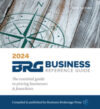 By Suzanne De Lucia CBI
By Suzanne De Lucia CBI
Fellow Of The IBBA
CABI Past President
Part 1 . . . . Part 2 . . . . Part 3 . . . . Part 4
CABI – Past Present & Future
Part 4 – Recession To Present
Disclaimer: This is the fourth and last in a series of short essays intended to educate current CABI members about the association’s history and lay the groundwork for the Annual meeting discussions to take place on January 20, 2016. As technology has changed dramatically and the CABI leadership has changed since the early days, much is being written from memory. Please forgive any slight inaccuracies or omission of names, as it is not intentional.
Starting in 2008, the Recession naturally had a huge impact on our industry. Our combined broker and associate membership numbers dropped steadily from 144 in 2008, to 122 in 2009, 110 in 2010, and bottoming out at 101 in 2011, then climbing slowly, but steadily to 103 in 2012, 111 in 2013, 116 in 2014 and ending up at 118 in 2015.
Fortunately, we did not suffer the fate of the IBBA. While official numbers aren’t available, it is believed that the organization dropped from approximately 2,000 members pre-recession to about 700 at the bottom. The IBBA never truly recovered membership wise, as along the way it became possible to belong to the M&A Source without paying IBBA dues.
This is all being stated to set the stage for what has been happening behind the scenes. Multiple things happened in tandem which affects your CABI today.
First, in 2008, the Colorado Real Estate Commission (CREC) decided to change the rules, and the blanket approval of IBBA courses for real estate commission credit was pulled. As this wasn’t taught in the continuing education courses, it took a little while to realize what was happening.
In 2011, a task force spearheaded by then CABI President Kevin Waide, and including Michael Marks, Tom Lindahl, Suzanne De Lucia and Shawn Sanborn, met with CREC officials. CREC outlined an arduous process by which CABI could submit their courses for CREC approval, which required the above members to go through each IBBA course and document the content on a 15 minute by 15 minute basis.
This extremely time consuming process was taken on by the team identified above and 55 courses were submitted to the commission. Unfortunately, only 22 of the courses were approved and many were not given the full number of credit hours that each course offered.
To add insult to injury, we did not know that these courses were only approved for a period of 3 years, and in the intervening years, many have expired. Nine of the remaining 12 will expire in June of this year, with the remaining 3 expiring at the end of 2017. To add insult to injury, some of these courses have been phased out by IBBA and are no longer available to present.
One more point related to the CREC is that, about 10 years ago, they began requiring an annual 4 hour update course, which is offered at our yearly CABI Conference. The effect of this requirement is that all brokers now only need to obtain 12 elective hours out of the 24 required continuing education hours every 3 years.
Post-recession, things which impacted CABI were changing at IBBA as well. IBBA made the decision to start transferring many of their courses to an online format from the traditional in-class style of presentation. This was fueled by changes in technology and educational trends, but also allowed many of their members to take courses at lower costs and not attend the more costly IBBA Conferences.
At the same time, the costs for CABI to present an IBBA course in Colorado skyrocketed. Today, IBBA requires CABI to pay $250 per student for every IBBA member and $350 for every non-IBBA member in each of their classroom style courses. This does not include the cost of the instructor (teaching fee, travel, hotel, per diem), facility, and food and beverage costs. This is a big difference from the $49 required when Darrell Fouts taught his first course here. Couple this with decreasing demand and, “Houston, we have a problem.”
Based upon the latest CABI educational survey, there was no single course that sufficient membership would attend where CABI could break even, never mind turn a profit.
Another big difference is that very few new CABI members belong to IBBA. Of our current 84 broker members, only 23 belong to IBBA and 17 of those joined CABI in 2006 or earlier. This means that only 6 of the 61 members who joined CABI in 2007 or later belong to IBBA! Wow, this was a surprise to learn.
You have probably noticed that CABI has not offered as many courses post-recession as prior. Hopefully, now you understand what has been occurring behind the scenes. It was unfortunate that the last IBBA course we tried to offer in October, 2015, had to be canceled due to insufficient sign ups.
Your CABI Board and your new Education Chair (that’s me) are looking to you for answers. Tomorrow night, there will be discussion of some decisions the Board has made in an attempt to provide solutions. Please bring your ideas and creative solutions and help lead CABI into a bright future with programs that work for all.


